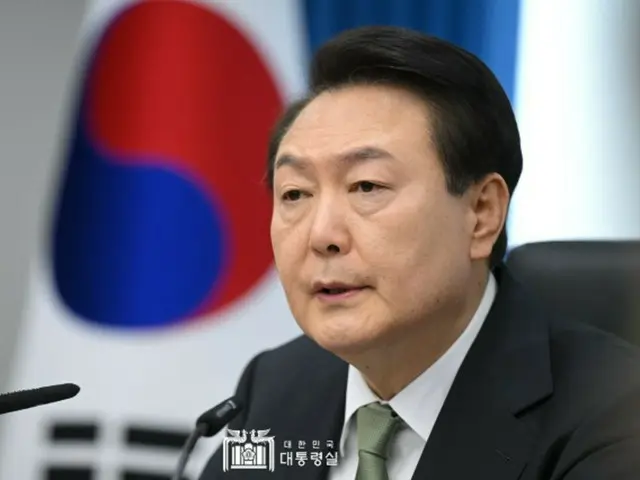A special investigation headquarters has been set up to investigate Yoon's declaration of "emergency martial law." The incumbent president enjoys immunity from arrest, but there is an exception for the crime of treason. On the 10th, the prosecution filed a motion calling for the declaration of martial law.
Kim Yong-hyun, the former Minister of National Defense who is said to have provided such advice, was arrested. The investigation into Yoon is also expected to accelerate.
Yoon made an emergency statement in the presidential office late on the 3rd. "The Democratic Party of Korea (the largest opposition party) has decided to establish a legislative independent government.
The court said, "This is an obvious anti-national act that tramples on the constitutional order of the Republic of Korea and plots civil war," and declared emergency martial law to eradicate "anti-national forces."
"We will rebuild and protect the free Republic of Korea, which is on the brink of ruin. We will eradicate the anti-national forces that have committed evil acts up until now," he said.
"The government must guarantee the freedom and safety of its citizens and the sustainability of the nation from the effects of the current crisis," he said. This is the first time martial law has been declared since democratization in 1987.
" is a type of martial law defined by the Korean Constitution, and is issued by the president in times of war, emergency, or other military emergencies to maintain public order. The military takes control of administrative and judicial functions.
It is also permitted to restrict freedom of speech, publication, and association. After the declaration, armed soldiers of the martial law army broke the glass and rushed into the National Diet Building. A HYERI helicopter, believed to be a military aircraft, was also seen flying over the National Diet.
In a situation reminiscent of the military regime, many citizens gathered in front of the National Diet after the martial law was declared, chanting slogans in opposition to the law and surrounding military vehicles, causing chaos.
If a majority of the National Assembly members request the lifting of martial law, the president must do so. Immediately after the declaration, a plenary session of the National Assembly was held, and all members present voted in favor. Yoon was in power for just six hours.
The main opposition Democratic Party and the Fatherland Reform Party have accused Yoon of tampering. On the 6th, Lee Jae-myung, the leader of the Democratic Party, made a special statement in the National Assembly, temporarily declaring "emergency martial law."
He criticized Yoon, who declared martial law, saying, "He is the mastermind of a clear crime of treason against the nation, who abused the democratic constitutional order for his own personal gain and for the strengthening and maintenance of his power."
"It is a rebellion, an act of insurrection, and a royal coup d'état, carried out to abolish state power or to violate the constitution," he said. Article 87 of the Korean Criminal Code states that if a riot is committed with the intent of eliminating state power or disrupting the national constitution,
The law stipulates that the President shall be punished as a crime of treason. The maximum penalty is the death penalty. Article 84 of the Korean Constitution stipulates that "The President shall not be subject to criminal prosecution while in office, except in cases of crimes of treason or foreign treason."
Although the incumbent president has immunity from arrest, the crime of treason is an exception, so it is possible to arrest and indict Yoon.
A team was formed to investigate the matter. The South Korean prosecution also set up a special investigation headquarters headed by the Seoul High Prosecutors' Office chief prosecutor. Meanwhile, a lawmaker from the ruling People Power Party said that Yoon was not guilty of treason.
Rep. Gang Seong Yeon said, "There is no intention to completely shut down the National Assembly to the extent that this (martial law) amounts to treason and to prevent National Assembly members from lifting the emergency martial law.
"I don't think there was any rebellion," he said. "At this point, it's impossible to say for sure that it was a rebellion." The legal profession has repeatedly pointed out that this constitutes a crime of rebellion, and the president of the Korean Bar Association said,
"It will be difficult for Yoon to completely deny the charges of treason. An investigation will be inevitable," Lim Jae-seong, a lawyer who is also known for representing the plaintiffs in the former forced labor lawsuit, told the media.
In a contribution to the South Korean newspaper Hankyoreh, the lawyer listed three reasons why Yoon could be charged with treason, and said, "The investigative authorities must immediately prepare to conduct compulsory investigations and request warrants against the president and the rebel forces.
Meanwhile, on the 10th, South Korean police arrested former Minister of National Defense Kim Yong-hyun on suspicion of sedition. This is the first arrest in connection with the "emergency martial law" that was declared on the 3rd of this month. Kim was arrested on the 8th at Seoul
"With Kim's arrest, the prosecution's investigation is expected to turn to President Yoon," Yonhap News Agency reported.
2024/12/11 12:31 KST
Copyrights(C)wowkorea.jp 5

